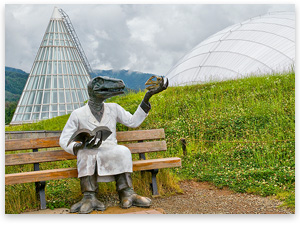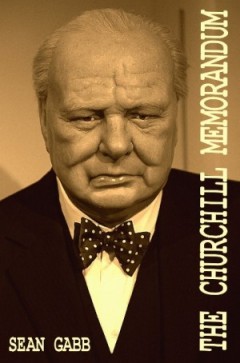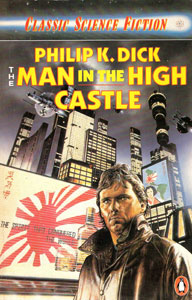
Dr. Uchronia
The history that didn’t happen can be just as interesting as the history that did.
This article is a small example of its own topic. Except by chance, I wouldn’t now be writing it. Not finding what I wanted while browsing in our library’s magazine aisles, I came across mention of “uchronie” in Le Nouvel Observateur. The philosopher Charles Renouvier chose this word as the title of his novel of 1857 and 1876; he coined it from Greek roots meaning “no time.” He was following the pattern set by St. Thomas More, whose Utopia derives from roots meaning “no place.” Utopia is a place that does not exist; uchronia is a time that did not exist. Uchronian works — to introduce the English adjective — are also called “what-if,” alternative, conjectural, or counterfactual history. They consider what would have happened if something else had chanced to happen.
Such works fall into two categories. The distinction is fuzzy but useful. Writings of the first kind, unlike actual history or a standard historical novel, are sheer fiction. They are not speculations about real events; they are stories that stand on their own. The Star Wars movies and Tolkien’s tales are good examples. Another is Islandia, a novel by Austin Tappan Wright, published posthumously in 1942. Wright describes events and personalities in a country on a fictional continent in the Southern Hemisphere before World War I. The people of Islandia, while highly civilized and advanced in philosophy and psychology, prefer their old ways, rejecting railroads and most other modern technology and narrowly limiting contact with the outside world. The reader (this one, anyway) drifts with the author into sympathy with the Islandian way of thinking.
Edward Bellamy’s Looking Backward (1887) projects an opposite vision, one intended as backward only in an ironic sense; it imagines a prosperous and happy socialist utopia of 2000. This uchronia actually exerted some influence in its time, converting many readers to socialism because they wanted to live in the world of Bellamy’s vision.
[continue reading…]
Help Promote Prometheus Unbound by Sharing this Post

I recently read The Churchill Memorandum, by English libertarian Sean Gabb. I devoured most of it on a transatlantic flight, and finished the last bit on terra firma. I tend to like thrillers (some favorite authors include Nelson DeMille and, of late, Cherie Priest, author of Bloodshot); alternate history (e.g., Harry Turtledove, Brad Linaweaver’s Moon of Ice, L. Neil Smith’s The Probability Broach); and books with libertarian themes or influences (L. Neil Smith, Ayn Rand, Henry Hazlitt, Brad Linaweaver, Victor Koman, J. Neil Schulman). So it’s no surprise I enjoyed The Churchill Memorandum, which is very well written and which combines all three features (full disclosure: Gabb is a friend).
The novel is set in 1959, in an alternate history in which Hitler died in a car accident in 1939, thus averting WWII and changing the course of history. Gabb’s libertarian influences — he’s the head of the UK Libertarian Alliance — as well as his deep historical knowledge, are evident throughout the book. The novel depicts amazing technological progress — some of it rivaling or exceeding 2011 levels — in 1959, since WWII did not occur to sap away the economic strength and entrepreneurial innovations of tens of millions of individuals who would otherwise have been eviscerated in state war. So in 1959 there are magnetic bullet trains, home energy generators, and many other seemingly fantastic innovations.
The story follows the adventures of one Anthony Markham, a Churchill historian who, on a trip to the now-fascist police-state and isolationist America to research the Churchill archives at Harvard, stumbles across an explosive document that purports to document secret pacts that changed the course of American and world history. This leads to an intriguing geopolitical thriller informed by the author’s libertarian views. It is told in first person point of view (POV), my personal favorite for thrillers (and other novels) since it forces the narrator to show not tell, and not to omnisciently cheat and reveal details the protagonist would not know. Gabb’s ambivalent and somewhat bipolar English attitude towards America — at once a great power and friend of England, and a schizophrenic and dangerous destroyer of the ancient European order and institutions — is present throughout; and as a skeptic of the American mythos myself, I really enjoyed this foreign perspective. (Gabb recently presented a talk on “The Case Against the American War of Independence.”)
[continue reading…]
Help Promote Prometheus Unbound by Sharing this Post

Author Philip K. Dick

It seems to me that of the two most important elements of a story, plot and character, plot seems to be more masculine and character more feminine. That is to say, a story for men, if it skimps on either of the two, is more likely to skimp on character, while a story for women will shortchange the plot. The best stories, of course, are strong in both categories. Science fiction, being a more masculine genre — in fact the only genre of fiction whose readership is more male than female — has traditionally been solid on plot and hit or miss with the characters. There are exceptions, as one would expect, and Philip K. Dick’s The Man in the High Castle, a Hugo Award winner, is one of these.
The story takes place in what was the present day when the novel was written, 1962, but in an alternate timeline where Nazi Germany and Imperial Japan won World War II. The United States has been carved into puppet governments; Germany has sent astronauts to Mars, drained the Mediterranean for farmland and committed multiple genocides; Japan controls the west coast of North America, having become a cultural as well as political hegemon.
It is a marvelous setting, both in conception and in description. Dick’s prose makes it come alive with a few deft touches here and there, sparse but effective. Whereas in most stories the setting serves as a place for the plot to take place, the reader here gets the sense that the plot is just something to have happen in the setting. The world and its characters are the point; what they do in the narrative has less importance.
[continue reading…]
Help Promote Prometheus Unbound by Sharing this Post












